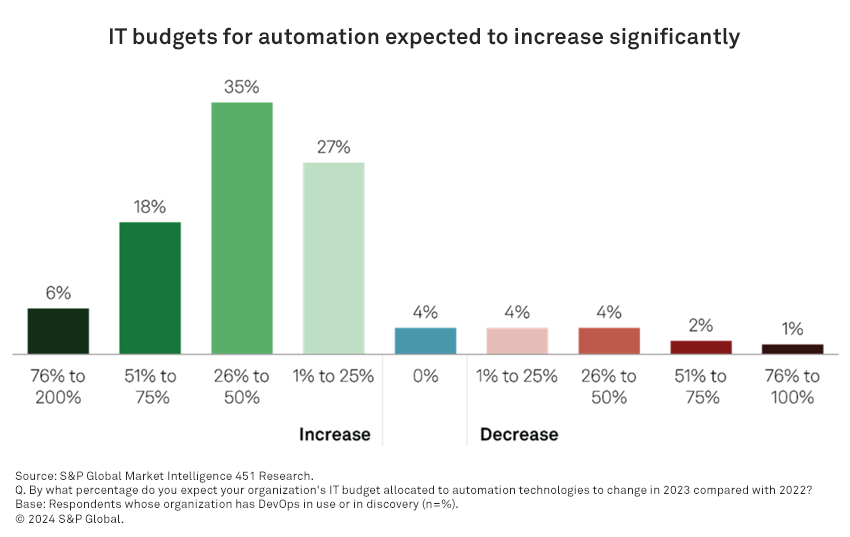
Source: MirageC/Moment via Getty Images.
In today’s rapidly evolving digital landscape, organizations are increasingly turning to artificial intelligence-powered intelligent automation platforms (IAPs) to drive their digital transformation initiatives. AI-powered IAPs integrate technologies such as robotic process automation (RPA), process discovery technology (PDT) and hybrid integration platforms (HIPs).
This two-part report includes key takeaways from 451 Research’s 2024 research agenda for automation, which will focus on the emerging capabilities of unified AI-powered IAPs, and how they are not only enhancing enterprise execution and performance, but also enabling event-driven automation, augmenting application development environments, and potentially transforming and creating new technology markets.
The importance of IAPs in digital business architecture
As organizations strive for a competitive edge, they are increasingly relying on IAPs to improve the execution and performance of their operations. Some organizations are even considering using IAPs to supplement or replace existing platforms for application development.
The growth of the IAP market
It is projected that the IAP market will experience significant growth, with an estimated compound annual growth rate of 19.5% from 2022 to 2027, according to a 451 Research report. This growth is driven by increasing investments in automation technology by modern enterprises. In fact, a survey conducted by 451 Research found that 86% of respondents expected their IT automation budgets to increase in 2023.

Shown in the chart above, more than four in five respondents (86%) from the same study expected their IT automation budgets to increase. About one-quarter of respondents (27%) expected a budget increase of 1%-25%. Just over one-third of respondents (35%) expected a 26%-50% increase. About one-fifth (18%) expected their budget to increase between 51% and 75%, and 6% expected their budget to increase between 75% and 200%. Only 4% expected no change, and 10% expected a decrease.
The benefits of AI-powered IAPs
The increase in IT automation budgets reflects the growing recognition of the benefits and potential of AI-powered IAPs. These platforms enable organizations to streamline their operations, improve efficiency, and reduce manual effort. By automating repetitive and mundane tasks, employees can focus on more strategic and creative work, leading to increased productivity and innovation.
Furthermore, AI-powered IAPs have the potential to transform the way organizations operate. They can enable organizations to leverage data-driven insights and make data-informed decisions. With advanced analytics and machine-learning capabilities, these platforms can analyze large volumes of data to identify patterns, trends and anomalies, enabling organizations to optimize their processes and drive business growth.
In addition, AI-powered intelligent automation platforms facilitate collaboration and knowledge sharing within organizations. By providing a centralized platform for process management and automation, these platforms enable teams to work together more effectively, share best practices, and leverage each other’s expertise. This collaborative approach fosters innovation and continuous improvement, driving organizational success.
Conclusion
As organizations continue to invest in intelligent process discovery and automation technologies, they are empowering their workforces to work smarter, faster and with less effort. This not only improves collaboration and productivity, but also uncovers hidden opportunities for improvements and enables new ways of conducting business.
Do you have your finger on the pulse of tech trends? Join the 451 Alliance for exclusive research content on industry-wide IT advancements. Do I qualify?
Want insights on consumer technology trends delivered to your inbox? Join the 451 Alliance.
This content may be AI-assisted and is composed, reviewed, edited and approved by S&P Global in accordance with our Terms of Service.
